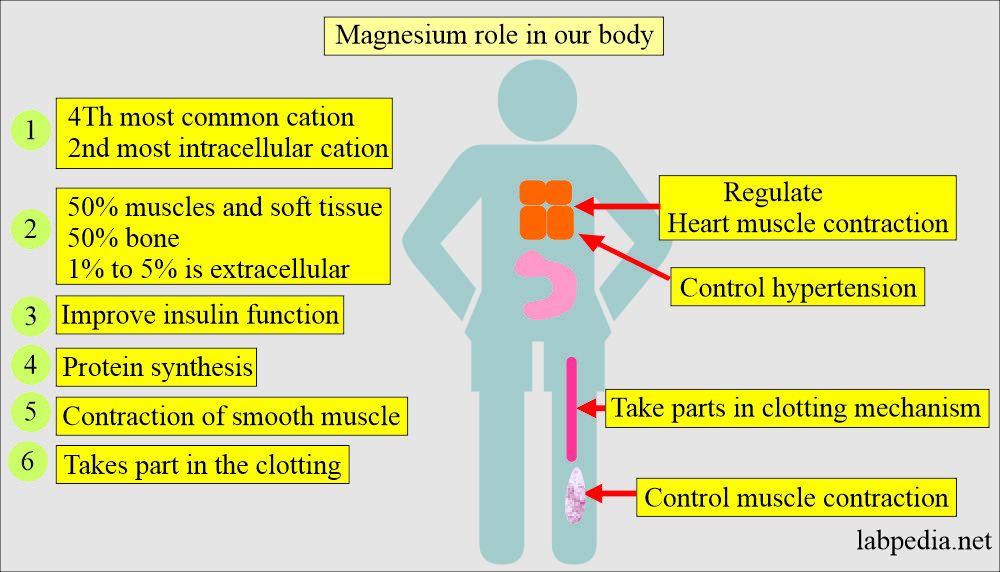Magnesium Role in Our Body
Magnesium Role in Our Body
What is the magnesium pathophysiology?
- Magnesium is 4th most common body cation after sodium, potassium, and calcium.
- 2nd is the most common intracellular cation after potassium.
- 50% is located in the soft tissue and muscles.
- 50% is present in the bone.
- Magnesium is a trace element involved in several hundred chemical reactions in the body.
- Magnesium is required by every cell of the body.
- 60% is present in the bones.
- Magnesium is needed for calcium metabolism.
Magnesium functions in the body are:
- Magnesium is needed and generates the adenosine triphosphate or ATP. We know that ATP is the energy source for various cells and chemical reactions.
- It takes part in the heart muscle contraction.
- It takes part in the contraction of the smooth muscles.
- It helps in mineral absorption.
- It helps in protein synthesis.
- It also takes part in the clotting mechanism.
- It helps in the function of insulin.
- There are studies that magnesium supplement helps in controlling hypertension and prevent strokes.
- A diet rich in magnesium and potassium reduces the medication for the control of hypertension in elderly patients.
- Magnesium, calcium, and potassium lead to the relaxation of the vascular smooth muscles, helping to keep blood vessels open and blood pressure under control.
- I/V magnesium during the attack of migraine decreases the pain and other symptoms.
- There are controlled studies where they found that a supplement of magnesium decreases the frequency of migraine attacks.
- Magnesium supplements are recommended in migraine patients.
- Magnesium benefits heart failure and heart attack patients.
- It helps in ladies with H/O preeclampsia.
- It also helps in cases of fatigue.
Magnesium deficiency leads to:
- Osteoporosis of the bone.
- Its deficiency is linked to insulin resistance, and a supplement may improve insulin sensitivity and insulin secretion in type 2 diabetes mellitus. The magnesium supplement increases insulin sensitivity and secretion, resulting in the regulation of blood glucose. There is no data for the favor of magnesium supplements in people with diabetes.
- Still, it is believed that magnesium supplements help people with diabetes by decreasing the risk of retinopathy and high blood pressure.
- It is found that a low level of ionized magnesium is seen during the migraine attack in 50% of the patients.
- Magnesium supplement in a healthy young person suppresses bone turnover.
A low level of magnesium may result from:
- Low intake of food.
- In patients with diarrhea.
- In Patients with H/O vomiting.
- Patients on chronic use of diuretic drugs.
- If there are too much sugar and fat in the food.
Sources of the magnesium:
- Nuts.
- Legumes.
- Vegetables.
- Soybeans.
- Kinds of seafood.
- Brown rice.
If you want to take the supplement, look for the Magnesium in citrate, aspartate, or malate form. Thes are better absorbed and tend to have laxative effects of magnesium sulfate.
The daily adult dose:
Female = 310 to 320 mg/day.
Male = 400 to 420 mg/day.
The maximum dose for any health problem may be up to 700 mg/day.
Side effects:
- If you have diarrhea, then reduce the dose.
- Patients with kidney diseases should consult their doctors.
- Pregnant ladies and women nursing the baby should also consult doctors.

